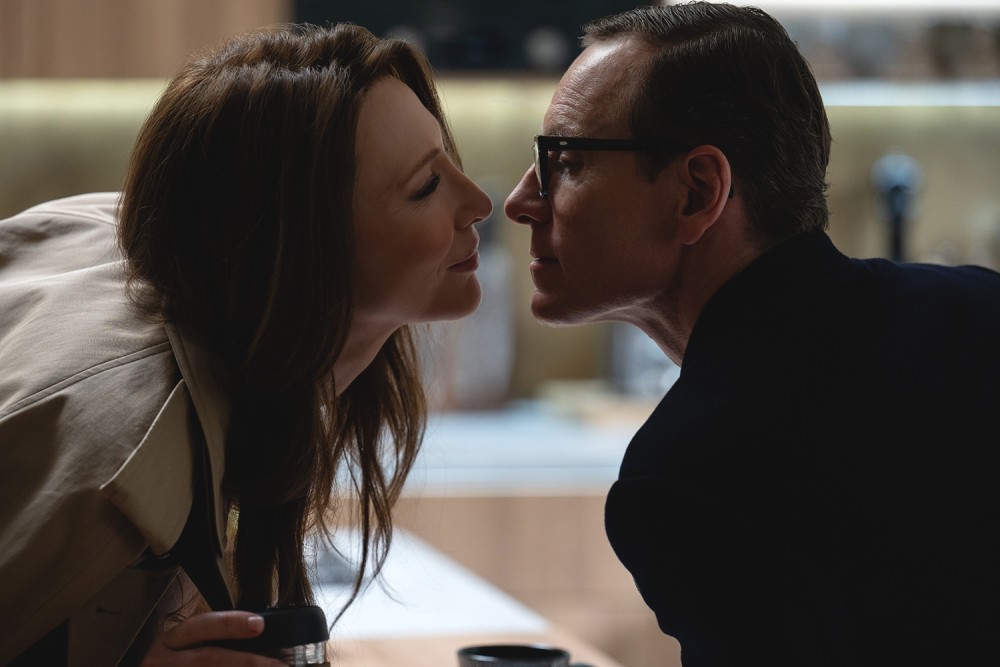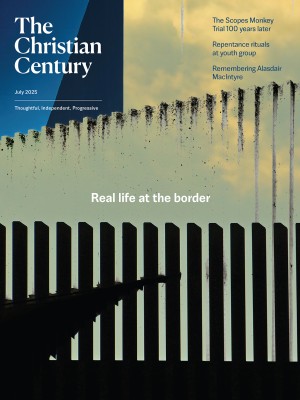Black Bag’s committed spies
In Steven Soderbergh’s latest movie, two MI6 agents have the audacity to put their marriage first.

“Not everyone aspires to your flagrant monogamy,” Philip Meacham (Gustaf Skarsgård) says a bit sarcastically to his colleague George Woodhouse (Michael Fassbender) in the opening scene of Black Bag (directed by Steven Soderbergh). The two men are discussing Philip’s infidelity, which has put his marriage in jeopardy. “I just wish it wasn’t so fucking easy to cheat. For us,” Philip complains. The “us” refers to their shared profession as British intelligence officers, a job in which lying, subterfuge, and moral ambiguity are less ethical dilemmas than professional skills.
The two men are discussing marriage because Philip has just handed George a list of names of other MI6 agents who are possible suspects in a devastating security leak of a top-secret computer code that can override nuclear safety protocols. George’s wife, Kathryn (Cate Blanchett), is on the list. George is the agency’s top internal security expert, with a reputation for sniffing out even the smallest of lies and remaining committed to truth even at great personal cost. “I hate liars,” he explains to a younger colleague when she learns the legendary story of how he exposed his own father, also a security agent, for infidelity and gross misconduct. But everyone knows George is unwaveringly devoted to Kathryn, and no one is sure how he will respond if she turns out to be the mole.
Read our latest issue or browse back issues.
This is ostensibly the tension of the film: two spies who spend their lives deceiving others and uncovering deception, forced to bring their professional lives into the domestic realm. But the real tension is monogamy itself. Single-minded devotion to anything but the mission is surely a liability, and Kathryn and George’s “flagrant monogamy” is seen as a professional and personal weakness.
The other people on George’s list of possible double agents are two other couples. Two central scenes involve George and Kathryn inviting these couples to their home so George can try to extract information and observe their reactions. What unfolds is enough vitriol, insecurity, and backbiting to make one foreswear dating forever. Although both couples are supposed to be in the first flushes of new love, their relationships are already riddled with loathing and lies. “When you can lie about everything, when you can deny everything, how do you tell the truth about anything?” asks Clarissa (Marisa Abela), a young data analyst and one part of a couple under investigation. “How does that work?”
This is well-worn territory in the spy genre. Everything the spy does is justified by a sense of existing just outside the moral and social laws that govern the rest of us. The spy isn’t governed by such prosaic conventions as “do not kill” and “do not cheat.” The spy may have sizzling affairs or even romance, but never something as boring and stable as monogamous marriage. Watching the spy slip the noose of middle-class morality is part of the titillating thrill of the genre.
Usually this is all part of the subtext of a spy story, the electric undercurrent that gives the morally ambiguous actions their vicarious zing. By centering the story around George and Kathryn’s marriage, the film suggests that this kind of moral pleading is as hollow as it sounds. The other couples don’t come off as glamorous spies elegantly skating on the edges of moral and social norms. They come off as stunted, confused adults who have forgotten there are even norms to flout.
You don’t have to be a spy to feel this moral vertigo. Most depictions of marriage in popular culture, especially among the wealthy, professional classes, assume this lack of moral center. Watching Black Bag, I kept thinking of the wealthy couples in the HBO series The White Lotus or the new AppleTV+ show Your Friends and Neighbors. In both cases, marriage is a merger of assets, a hedge to protect wealth, or maybe a chance to maximize personal growth. But it is almost never a bulwark against deception or infidelity, which prove to be the rule more than the exception, with or without the excuse of national security.
Maybe morality is the wrong measure in these cases. George and Kathryn’s marriage isn’t predicated on some inviolable moral law; they don’t remain faithful out of fear of religious or social reprisals. Their monogamy is more like an anchor in a world that strips everything for parts and assumes everything can be leveraged or expended for self-interest.
George and Kathryn’s home is swaddled in golden light and dark green and wood tones, signaling their elegance and wealth but also setting up a contrast to the world of intelligence work, which is all glass and steel and florescent light. This could suggest that their home is full of secrets and dark corners compared to the bright revelations of their office space, where everyone can see everything.
As the plot unfolds with schemes and counterschemes, stolen secrets, and double crosses, the valence of these spaces shifts. Their home feels more like a final refuge of privacy and reticence, a hearth with a secret fire they tend away from the harsh demands to strip themselves of all individual commitments and loyalties. As the guests at their dinner party trade recriminations, George and Kathryn’s eyes lock across the table like smoldering coals, hinting at a world of private commitments that gives them ballast. Everyone around them feels the pull of their commitment, but it is precisely the thing no one else can access, hack, or share.
Their colleagues assume this is a weakness. Much of the plot revolves around other people trying to exploit their devotion to each other for their own ends. But their monogamy isn’t a rule to be followed for other ends. It is an end in itself, and it’s their greatest asset.







